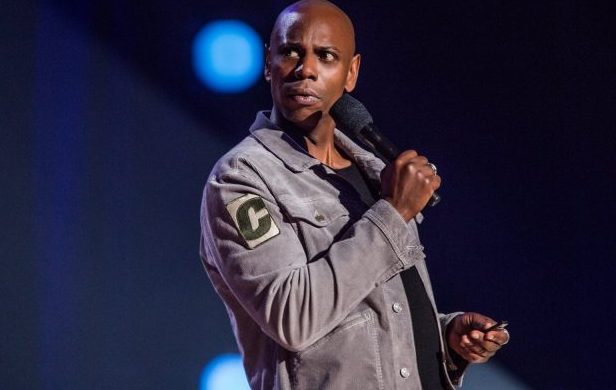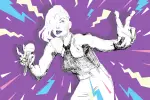Comedy heavyweight Dave Chappelle has long been revered for taking on taboo topics and providing a wry, untapped perspective in the form of off-color jokes.
He established this reputation for himself in the hugely successful Comedy Central series “Chappelle’s Show;” more recently, in the form of four 2017 Netflix specials, the funnyman proved to the public that he hadn’t lost his audacious edge.
However, many viewers found the two most recent Chappelle comedy specials — and the comedian’s willingness to push the envelope therein — more offensive than amusing.
Back when the first two of these specials were released, Chappelle came under fire for telling jokes about trans people. The majority of viewers were not bothered; still, many found the implications troubling and criticized the comedian for deriding a community about which he knows so little.
In the first of his two specials (entitled “Equanimity”), part of his act included a response to this recent backlash. However, instead of apologizing to those whom he offended, he stuck to his guns and fired off even more jokes about trans people. Chappelle very clearly had no qualms about what he said, asserting his right as a comedian to say what the average civilian wouldn’t or couldn’t.
Chappelle is one of many prominent comedians who rejects the notion of “PC culture,” or the increasingly prevalent phenomenon of audiences reacting badly to politically incorrect offensive material. In “Equanimity,” he asks why “everybody got this goddamn sensitive” speaking to audiences in general and trans people in particular.
It’s understandable Chappelle is so frustrated by these new standards that viewers hold him to; comedians have always pushed boundaries and brought important issues to light. They’re supposed to make people laugh about that which isn’t entirely socially acceptable to laugh at; it’s part of their job.
In a sense, Chappelle and his colleagues are absolutely right to speak their minds and defend their material, regardless of how harsh it gets — it’s a part of their job to make the jokes they feel compelled to make.
At the same time, however, comedians also serve to provide perspective and moments of levity to their audiences. Those audiences includes trans people, and many cis people who sympathize with their struggle. If trans people have to listen to insults instead of getting a good, safe laugh, then Chappelle hasn’t performed to his full potential.
In addition, he will inevitably have cis audience members who come away thinking of trans folk only as a joke, causing even greater damage. His goal shouldn’t be to fuel ignorance and spread hate toward a disenfranchised minority group; unfortunately for him, something as innocuous as a joke has the capacity to be incredibly harmful.
That sort of humor doesn’t just offend trans people or their allies; it trivializes the struggle of being transgender.
Life for trans people today includes bathroom bills stripping away basic human rights, constant fear of discrimination, harassment and violence. 75 percent of trans youth feel unsafe at school and violence against the community is on the rise, disproportionately affecting trans women of color.
With these issues already largely overlooked by cis people, one has to wonder whether it’s fair for someone who knows this little about trans people to be making such cruel jokes, so visibly, at their expense.
To be frank, trans people get enough shit as it is — not only is it inappropriate, but it’s incredibly callous for Chappelle to pile on more hate, stereotypes and confusion about trans people to his overwhelmingly cis fan base, many of whom undoubtedly hold transphobic prejudice that they’re trying to justify.
Look, I love a mean joke as much as the next guy — and, honestly, who doesn’t love horrifyingly dark comedy? Comedians like Chappelle, shows like “It’s Always Sunny in Philadelphia,” or “Archer” and even games like Cards Against Humanity all speak to a desire in people to find pleasure in the unpleasant and gruesome; there’s a lot of humor built-in there naturally.
I don’t blame Chappelle, then, for saying something shocking, or for speaking candidly from one of his mind’s less reputable recesses. One couldn’t expect anything less from a Chappelle comedy special. However, at the risk of sounding like a “libtard,” the jokes went too far.
In consuming media, I occasionally indulge in low-brow humor and try to sidestep the “snowflake” stereotype projected onto 20-somethings. It seems to me that it’s important not to appear “difficult,” so that my opinions will still be taken seriously.
Still, I also try to stand up for what I believe is right when it’s challenged. In this case, as I’ve said, I recognize both sides of the dispute. Ultimately, however, the jokes were harmful and in poor taste. Not only that, but they weren’t even really funny.
From saying “Yuck” about the thought of Caitlyn Jenner’s body, to trivializing the trans experience by equating it to the “transracial” Rachel Dolezal, Chappelle doesn’t pull any punches with the trans jokes. This kind of humor can be handled properly, but Chappelle wrecks his credibility outright by saying “I don’t understand [trans people], either.”
He makes it very clear that he knows nothing about his subject matter, tainting whatever humor you manage to find in these jokes with a lack of understanding. The jokes feel more like an attack more than any kind of lighthearted observation.
That’s the difference between Chappelle and someone like comedian Ian Harvie — Chappelle’s jokes don’t come from an appreciation; they come from confusion and fear.
What’s worse is his audience gives him all the support in the world, egging on his ignorance; as he rips through all of his trans material, the audience becomes progressively empowered to react honestly.
First, the laughs seem like the ones your parents give when you’re in the room and someone tells a not-so-PC joke. They’re half ashamed to laugh because they realize how grossly offensive it is, but aren’t going to deny that it appeals to a less sensible side of them.
When Chappelle suggests he slept with a trans woman in a later bit, the emboldened crowd expresses audible disgust. He responds with “Oh, grow up. That doesn’t make me gay” when they groan at this.
It’s difficult to just sit and laugh when trans people (and now gay people) are subjected to a twisted kind of amused revulsion by all the cis and straight people present. This is not humor so much as it is a showcase of all these people’s hidden prejudices, revealing privilege and an unsettling openness to bigoted rhetoric.
So now what? Do we hate Dave Chappelle? Should we organize a boycott? Are you going to have to make your dad throw out his “Chappelle’s Show” box set? First of all, no to all of these; you will accomplish little following these routes. Also, there is one saving grace to the transphobia in Chappelle’s comedy special.
Amid the tasteless jokes, the comedian does make a valid point about the greater conversation regarding transgender rights. The way he broaches the subject is somewhat ignorant, but he presents some incredibly sharp commentary when he says that “[The conversation about trans rights] reeks of white privilege.”
Up to this point, he has lost his footing in any social or political discourse, painting himself as just a cis guy making light of trans lives, with no real insight or argument to offer, only low blows. Now, he’s a black man drawing attention to society’s favorable treatment of white people.
Society discusses transgender rights, he insinuates, in part because the most prominent public figure who has transitioned was white. “You never asked yourself: why it was easier for [Caitlyn] Jenner to change [her] gender than it was for Cassius Clay to change his fucking name?”
Transgender rights, Chappelle says, are prioritized over black lives, so long as the trans people are white and preferably wealthy.
Still, the problem with what he says here, other than misgendering and dead-naming Caitlyn Jenner, is that trans people of color exist, so trans issues don’t only affect white people. In fact, Laverne Cox and Janet Mock, some of the most visible transgender women after Jenner, are women of color.
However, overall, Chappelle raises a largely unexamined point: White people care less about the rights and lives of black people than they do of other white people, even if they’re queer. There’s a phenomenon where people care more about gay men than they do about lesbians, or vice versa.
Or sometimes they’re in support of gay rights, but not of trans people in the least. It’s possible that this selective allyhood also affects how white people prefer to advocate for transgender people but not for black people.
Race and gender make trans women of color incredibly vulnerable, with violence affecting them at an alarmingly high rate. Chappelle doesn’t take into account the diversity of trans people or their experiences, but he does focus on how race affects the way people view trans issues relative to issues facing black people.
He keys into the fact that most white people are apathetic toward or averse to anything racial that enters their spheres. For example, white people are more likely to endorse Jenner than they are to endorse Muhammad Ali, simply because one’s white and the other was not.
Do I think this means that cis white people, generally, care about trans rights? Absolutely not, although I don’t think that’s what Chappelle is saying. However, it is important to note that color shapes the way people view these separate issues, along with the people they affect.
Does this insight negate his transphobia? Not at all. Chappelle’s narrowmindedness is mind-boggling, and I personally won’t at any point be able to overlook it or enjoy the special. With that said, his brief insight gives the special an analytical edge, which makes it a lot more respectable than it would be if he’d just made offensive jokes without any rhyme or reason.
Not that it excuses his clear prejudice toward trans people, but at least he explained in part why he feels the way he does. One piece of wisdom doesn’t overshadow all of the bigotry; it does, however, redeem Chappelle as a critic of culture and as a decent person.
At the end of the day, Chappelle still lives up to his legendary status whether you agree with him or not. Maybe “Equanimity” is a bit subpar, but he set the bar for himself pretty high early in his career; besides, he’s got a vast catalogue of other material for you to enjoy if this doesn’t work for you.
On the whole, Chappelle has enough good to outweigh the bad. Still, one shouldn’t ignore the fact that he may unintentionally cause harm to trans people. My hope is that he takes a page from Sarah Silverman, seeing political correctness as something to uphold and adapt to instead of something to fight against.
Until then, readers, be wary and be woke. Laugh at that which you feel comfortable laughing and don’t be afraid to walk away from some bad humor if you find it distasteful; acknowledge that you can still support people who make mistakes. Strive for equality and understanding, but don’t shrink from laughing at a mean or dirty joke. Just know where to draw the line.

















